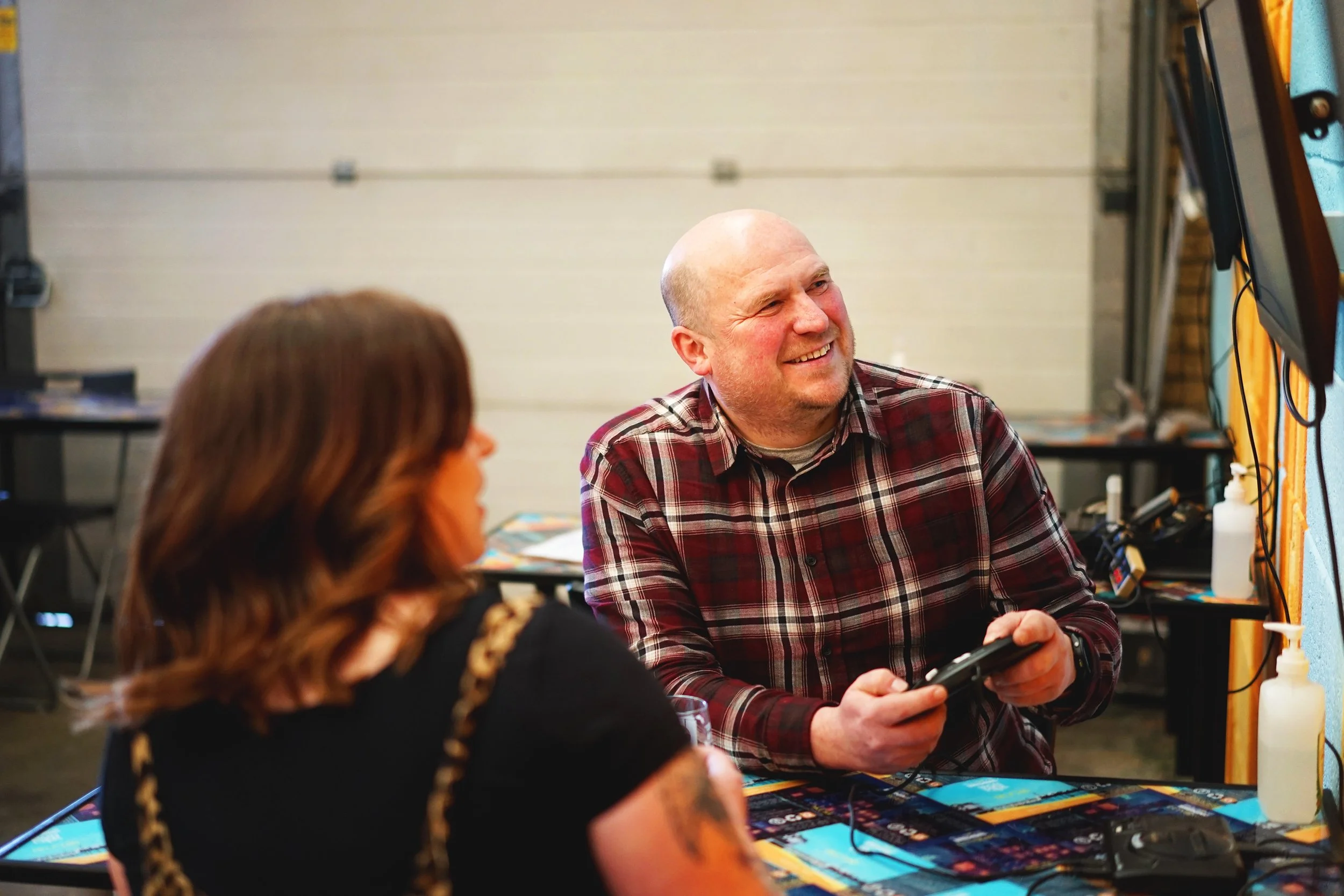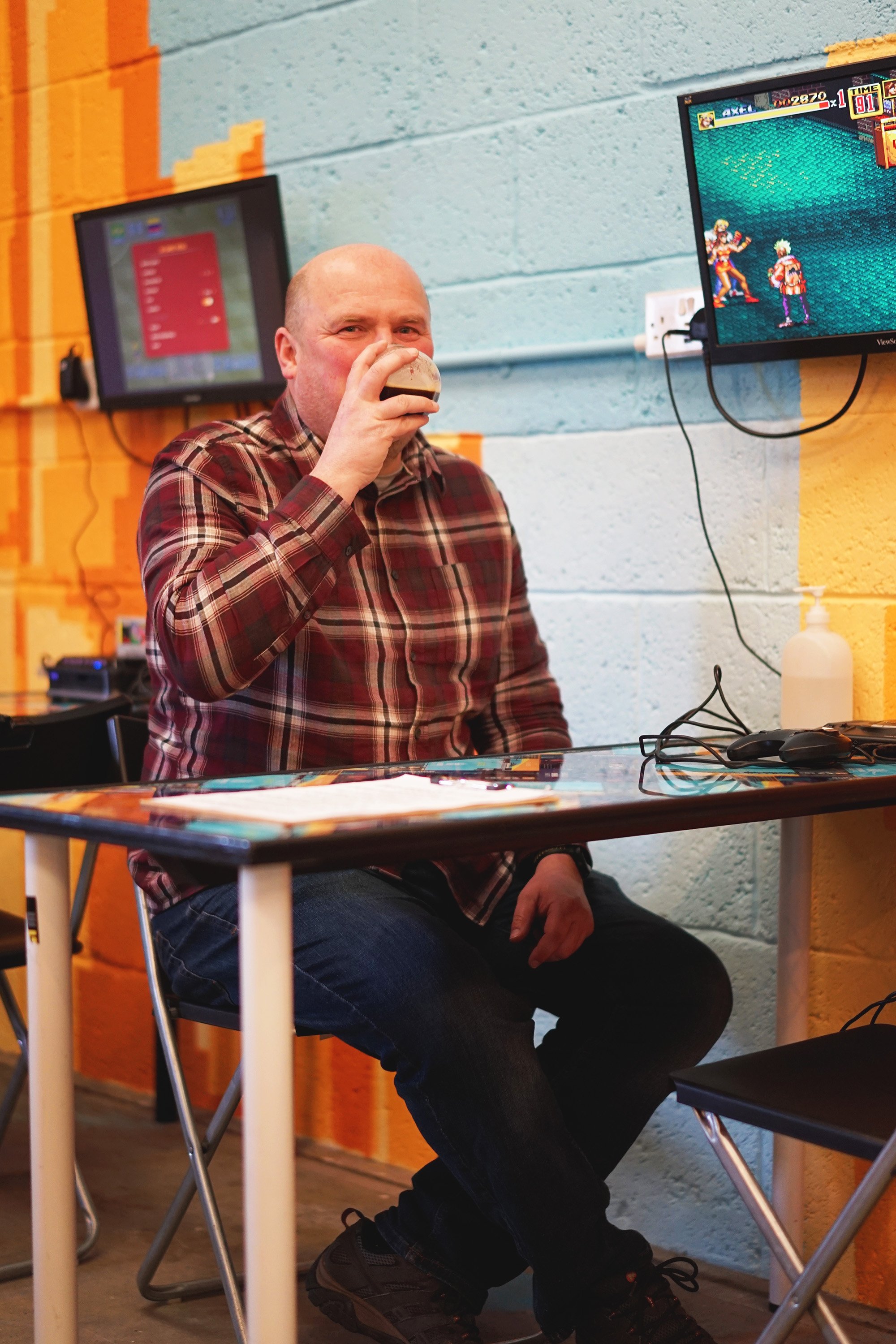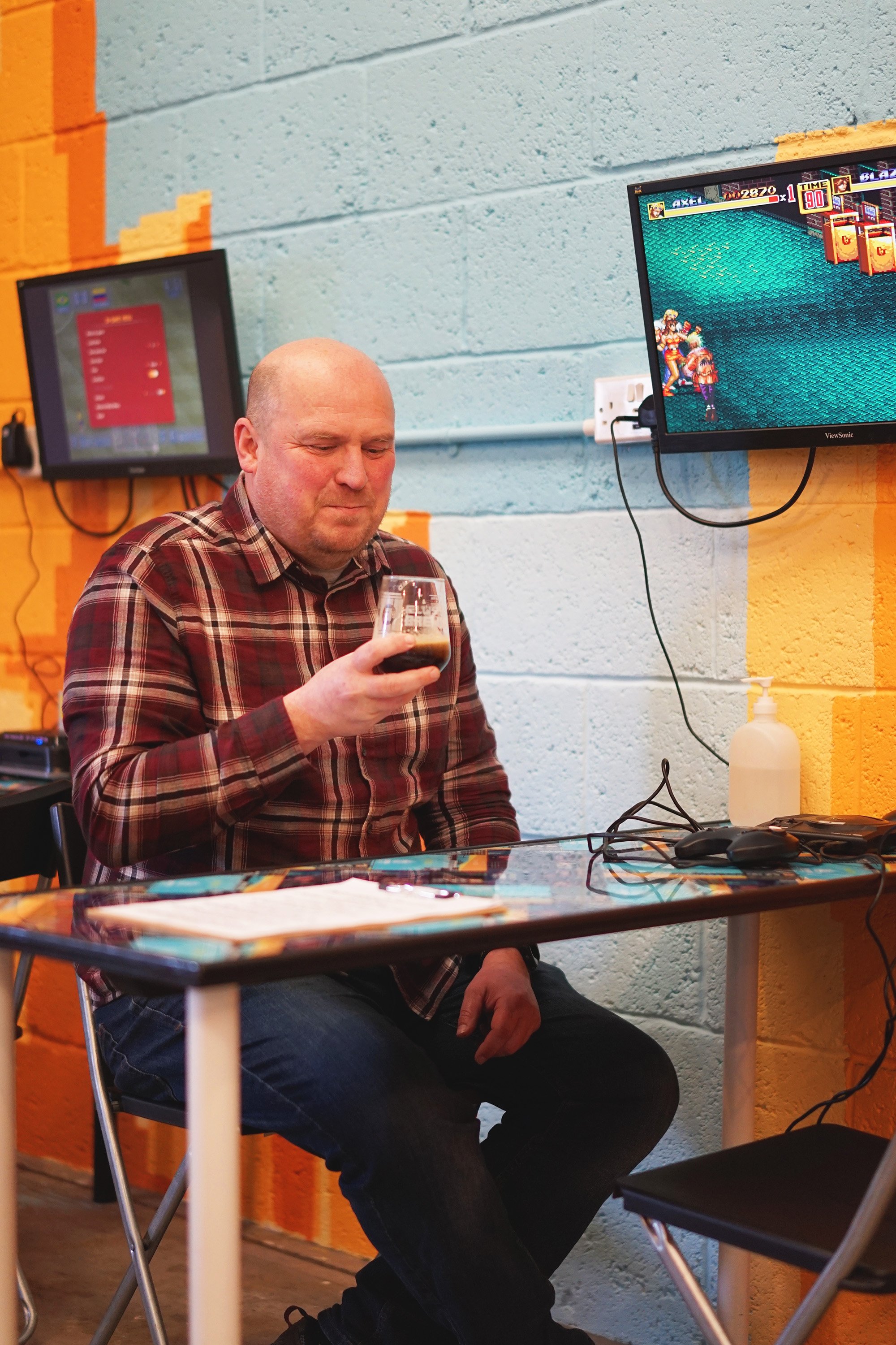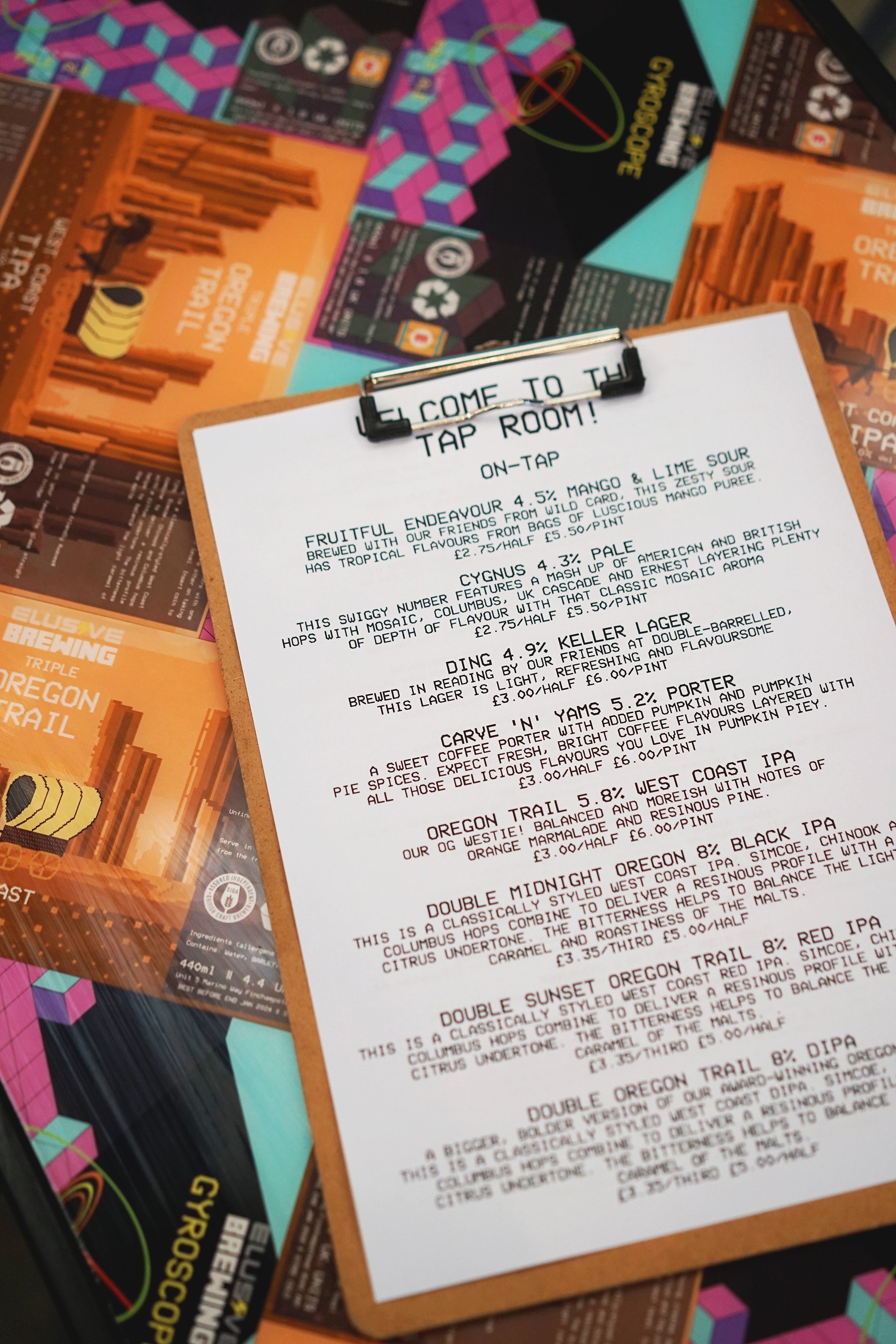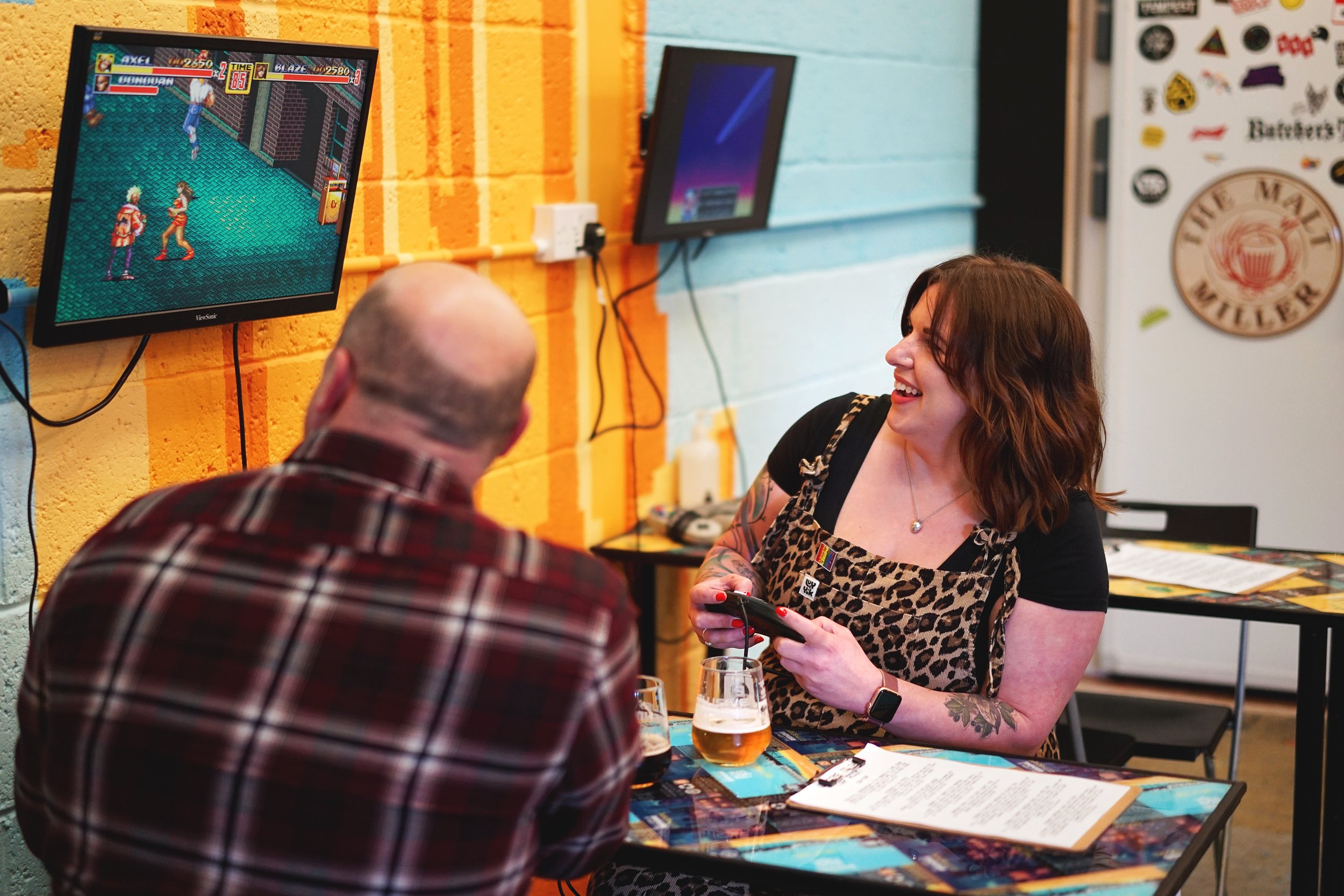Ready Player One — Elusive Brewing in Wokingham, Berkshire
“There’s a lot worse things to be known for I suppose.”
I’ve just asked Andy Parker, the founder of Elusive Brewing in Wokingham, Berkshire, how he feels about being known to many as, “the nicest man in beer.”
The word ‘nice’ has often been banned by editors I’ve worked with. The attributive adjective is seen as a nothing word, used to describe anything from Rich Tea biscuits, to mild weather, or a stranger’s demeanour. It’s an archetypal British word, and one Andy is forever linked to.
Worst of all, it’s a term that does him and his incredible brewery a disservice. Firstly, yes he is the nicest guy in beer, but there’s nothing superficial about why he’s ‘nice.’ Many people I speak to describe him as one of the most thoughtful, kind and—above all—considerate humans they’ve come across. I found him to be a great listener in the numerous times we’ve met.
Photography by Matthew Curtis
“A lot of people say ‘Andy is the nicest man in beer’ but I don't think they appreciate how true that is, or why they say it,” Steve Dunkley of Manchester’s Beer Nouveau tells me.
“He always has time for anyone of any skill level, he's always sharing his knowledge, never pretending he knows more than anyone, and always trying to learn more himself. And he's so selfless about it all.”
Secondly, reducing his life and work to one word trivialises how special the beer he makes is, and how uniquely talented a brewer he is. Take what is arguably Elusive’s flagship, Oregon Trail, a very West Coast-y IPA, brewed with Chinook, Simcoe, Columbus hops—so finely balanced and subtle it offers a series of experiences: Grapefruit on the nose (the Chinook), with bitterness boldly coming through on first sip, with citrus (the understated Columbus) appearing a millisecond later without any tartness but once you acclimatise to this mild tartness other flavour profiles appear, most notably lychee (the Simcoe).
Andy is keen to mention the other ingredients that make this IPA so special during a trip to the Nag’s Head in Reading. Here we’re served Oregon Trail on cask in a setting he describes as (twice) “a beer festival in a pub,” because of the range on offer—12 cask lines in a friendly, community setting.
“The rye gives it a bit of spice,” he says while sipping a half pint. “The caramel gives it sweetness without too much colour. It’s a case of getting the grist (milled malt) sweet enough to balance the bitterness which [initially] took three or four brews. The first few brews were darker and a bit too sweet.”
Oregon Trail is a beer that continually reminds drinkers of its sheer marvelousness long after they’ve left the pub. How can a beer be both so simple and yet so complex? It’s quite simply the best UK-brewed West Coast IPA, at least according to host of the Beer Prime podcast, Paul Newton.
“It has all that I ask for in a Westie,” he says. “Intense bitterness—those piney, resinous, citrus and caramel notes. Plus a clean, dry finish that makes you go in for the next sip before your glass has even touched the beer mat from the last one.”
But when I ask publican Jody Oates at the Nag’s Head what his customers love about it, there’s a long pause broken by laughter, before he answers, dryly: “It’s a good beer.”
***
Andy’s journey from experimental homebrewer to Elusive owner and operator was documented in detail in his 2018 book CAMRA's Essential Home Brewing. He also blogged about beer and homebrewing from 2010 under the name ‘Musings of an Elusive Beer Geek.’ But to properly understand his origin story we have to go back to 1983.
At 10 years old, Andy first caught a glimpse of a beige plastic box that would change his life. The BBC Micro is now the kind of retro computer that looks garish from the harsh glare of tech-savvy 2024—a box monitor, sat on a basic 8-bit processor and Cold War nuclear launchpad-style keyboard. But to schoolchildren like Andy, it was a glimpse into the future.
Nearly 80% of schools in the 1980s had this machine and I, like Andy, remember sneaking into the IT room on lunch breaks to play games. I loved Tea Shop, Andy adored Granny’s Garden. The Micro inspired schoolchildren to be interested in programming and to create games. “I made a lot of maths games,” Andy says. “A number generator. I did a cowboy platform game where he used to jump gaps.”
Today, videogames are put together like Hollywood films by hundreds of game developers and lavish production teams. A bluechip release, such as Grand Theft Auto V, can even employ a team of about a thousand. But these 1980s games were ‘homebrew’ affairs, designed in bedrooms with an often idiosyncratic British feel. I mentioned Tea Shop—here you simply sold mugs of tea and lost money when it rained. “It was a harsh life lesson,” Andy laughs.
In many ways these vintage games, which Andy loves and have inspired the Elusive brand, are made in a very similar vein to how Andy first brewed beer in his kitchen on Sundays. Both reached further than they were originally intended, and both had a personal—very British—stamp.
“It was an escape,” he tells me, “just a way of having a bit of fun. My job at the time was online operations for JP Morgan and my last job before I came here was working on streaming video of the Rugby World Cup in 2015—it was pretty full on. Live sport is very stressful.
“I’d just do it on a Sunday. And once I’d finished brewing I’d make dinner. That was it—take the kitchen over for a day, and chill the wort in the bath.”
But it wasn’t just the homebrew nature of retro gaming that equipped Andy, it was the skills he had gained in the classroom on the Micro that were used as he realised using online research was key to making good beer.
“When I started homebrewing it was about the process and I bought software to help with the recipes,” Andy adds. “The technical aspect was quite interesting as well. But the need to be systematic and have a logical approach when things go wrong shows there’s definitely a crossover in skills.”
Andy grew up in Farnborough, which is about eight miles from where the brewery is now located in Wokingham. He tells me how, other than a couple of years when he lived in the US, he’s always been pretty local, and now lives in the town of Fleet, a similar distance away from Elusive.
25 years ago Andy worked in Silicon Valley, after his apprenticeship (he didn’t go to university) led him to work for Sun Microsystems in 1996.
““A lot of people say ‘Andy is the nicest man in beer’ but I don’t think they appreciate how true that is, or why they say it.””
“It was quite a cool time to be there. It was the dot.com boom and companies like Google were starting—it was fun watching it all unfold. I was in my mid-20s, meeting friends in a bar and not really thinking about what we were drinking too much,” Andy says.
“But I remember drinking Sierra Nevada Pale Ale—it was extremely bitter and I couldn’t finish it. I had a Coors Light instead!”
Pale ales like the aforementioned classic from Sierra Nevada would become a gateway to what was to eventually be deemed ‘Craft’ beer. Andy, however, preferred Anchor Steam Beer, and he previously tried Samuel Adams on tap in a bar in Boston in 1995, which he found to be, “more sweet and malty than Sierra Nevada.”
Despite the mixed results tasting beers in bars, this time was probably more marked by his nascent attempts at homebrewing. He was gifted a Boots beer kit at Christmas, used a garage made warm by a tumble dryer as a brewing space, and invited some friends round to watch the Superbowl and taste it. What could go wrong?
“I opened the tap and it blew the glass out of my hand [and] onto the floor,” Andy says. “We eventually got something in a jug and served it. It was awful.”
This attempt at a homebrew may have put a group of Andy’s American friends off best bitter for life—who tipped it down the sink and picked up their preferred Coors Light—but it still didn’t faze Andy, who then set about homebrewing in a much more methodical way.
But instead of it being nascent craft beers in the US, it was Belgian Trappist-style ales that really showed him how the boundaries of beer could be expanded. After he moved back from the US in 2000, he worked in London and would regularly visit the Dovetail in Clerkenwell and The Rake in Borough after work.
“My obsession really started with Belgian beer and going to Belgian Beer Weekend in Brussels,” he says. “Then I joined Twitter in 2010, following Beer Merchants and ordering a box of Mikkeller beers. They really blew me away.”
While Twitter (or X, if you must) is now more of a decaying hellhole of abuse than a functional social media network, 13 years ago Andy was able to find a network of homebrewers and beer lovers. This group was discovering new beers from breweries—like Mikkeller and BrewDog—that defined the idea of ‘craft’ in the days when their corporate reputations hadn’t been self-sabotaged by numerous scandals (not to mention allegations of workplace abuse) that, ironically, gained traction on social media.
Despite this, Andy still finds Twitter to be a rewarding space. “That network [on X] has been going on for a while,” he says. “I try to keep things going by helping out others.”
“You get some breweries who act like [their recipes] are like the location of the Ark of the Covenant,” homebrewer and writer Paul Crowther, who also creates beers inspired by video games, tells me. “I’ve approached brewery staff before and it’s as if I’m asking them for nuclear launch codes.”
“He’s one of us. Especially in his sensibilities and his approach to brewing.”
***
“He is his persona,” Gregg Irwin, export sales manager at Siren tells me. “Just a really nice guy to have a beer with. But my next recollection was ‘damn! This guy can brew a beer.’”
I was on the phone with Gregg to get the details of when Andy was momentarily mistaken for Pablo Escobar in 2012 at an airport but he couldn’t remember the event. Luckily, Andy can. “I brought some Nelson Sauvin hops. I was in customs in LA after flying from Fiji, I ticked the box saying I had plants and I was stopped.
“The guy took my bag out and said ‘what have you got here?’ I told him I was brewing beer and he said ‘my neighbour does that’ and he just waved me through.”
Gregg founded Weird Beard brewery with Brian Spooner in 2013. One of the first steps they took was to collaborate with Andy on their 10th batch, after they had tasted the Saison he had homebrewed with the ‘contraband’ hops a year previously.
This first commercial beer Andy was involved with was imaginatively named: Single Hop Series No 2: Nelson Sauvin. It is still brewed annually by Elusive, although it’s now better known as Lord Nelson, and Weird Beard is sadly no longer trading. At the time Single Hop was mainly distributed in bottles, but some bars took kegs.
“Saisons always make for an interesting bottle condition,” Gregg says. “It was an experiment because sometimes they got a little bit lively. It was in the bad old days when breweries didn’t really know what they were doing!”
It’s clear that Andy enthuses people with joy due to the compassionate way in which he carries himself, but he’s managed to spread this far and wide through the quality of his beer. Lord Nelson is a saison that will convert even the most ardent “beer’s supposed to be brown” sceptic because it’s so complex, yet also so finely balanced.
““He’s one of us. Especially in his sensibilities and his approach to brewing.””
There’s a slight fruity ester character on the nose from the Belgian yeast, a saison grist of Pilsner, Munich and Vienna malts which gives way to the glorious tartness of gooseberry. Despite being 6.8% ABV it’s incredibly light on the palate, but it's complex enough to help you resist gulping it straight down.
“That saison became our first ever commercial beer,” says Andy. “We’ve still got some—it doesn’t sell!”
“That’s not fair!” He’s interrupted by Elusive’s current managing director, Ruth Mitchell, who originally joined the company to head up sales in 2021, but was appointed to the company’s most senior role by Andy in September 2022. “Andy, if you look at the rate of sales from two years ago you’d be really pleased,” she adds.
In any case, the first Nelson that was commercially brewed won prizes in several beer competitions. This gave Andy confidence to launch Elusive—“It was my first ever successful beer” but he continued blogging, and his online following became loyal to his brand.
The company was founded with his wife, Jane, but despite his business and IT research background, Andy doesn’t see himself as a natural entrepreneur. Certainly not someone who yearned to be their own boss.
“I said to Jane that the only way we could do this is with our own money,” he says. “I’m a very risk averse person. And the only way to do this without me worrying was not to borrow money. We put £55,000 in and not a penny more after. [About three years] later we succumbed and borrowed to buy a delivery van.”
“That was always my thing. If we’re going to grow we’re going to do so organically. And it meant when heading into lockdown the business was never at risk.”
***
It was during the Covid-19 lockdown in early 2020 that I first noticed the distinct retro-videogame cans that are Elusive’s hallmark. Jones of Brockley in South East London isn’t really a beer destination, as most of the deli’s customers don’t come specifically for a certain beer—more cheese. But a can of Oregon Trail stood out among the pale ales and lagers on the shelf.
Before the first lockdown this kind of interaction would’ve been impossible for anyone outside the Berkshire area, but Elusive gained a cult following as the beers started to appear with many intrigued by the can design based on games from yesteryear. I, admittedly, thought it was a gimmick—now I know better—but it’s led to copycats.
“People will tag breweries on Twitter and grass them up,” Andy says. “It’s flattering! What can we do? We don’t own the retro game market.”
But it’s this artwork—which at first was designed by Andy’s wife Jane—that leads many to Elusive.
“I’m next to the [National Videogame] museum,” Jules Gray, owner of Sheffield-based bottle shop Hop Hideout tells me. “I’ll get people coming in and recognising the games from the cans—people who get the references straight away. Someone like me who doesn’t get the references, they still jump out from the shelf because they are so unique and different.”
““Bringing Ruth in to be director of a company he started was a powerful message for women in beer.””
Andy admits when they started the business in 2016, he really wasn’t a salesperson and Elusive really didn’t do outbound selling. “Most of our beer went locally then,” he says. “I don’t know if there was one tipping point but in lockdown when we started canning then our beers got further afield through the courier network.”
Today, the brewery produces about 1,100 HL of beer annually—about 194,000 pints—which sounds like a lot, but is 16 times less than neighbours’ Siren Craft Brew’s output. A forthcoming expansion will allow Elusive to produce 60% more beer, meaning more Oregon Trail will be produced to meet the substantial demand. Ruth admits, though, they would be very isolated without the bigger neighbour’s in-person support.
“It’s great having Andy on the same estate as us,” Sean Knight, head brewer at Siren, tells me. “We are both very open-book brewers and always love to have someone like him to bounce ideas off or get feedback on one of our new beers.”
***
Myself, Andy, and Ruth are sitting in the brewery’s office, which at the time of my visit doubled at the weekend as a taproom, but both have been moved a few yards to a different unit and the space we’re currently in is now being used for the aforementioned expansion. There’s numerous retro game machines playing Nintendo and Sega hits, such as Sonic the Hedgehog or Street Fighter II, and my eye keeps getting drawn to childhood favourites while I’m supposed to be conducting a linear interview.
This means Andy’s answers are constantly interrupted by my stream-of-conscious musings on Streets of Rage or GoldenEye. Nice? I’d say Andy is extremely patient. As is Ruth who listens to both of us chatting away after diligently picking me up from Wokingham train station.
“Bringing Ruth in to be director of a company he started was a powerful message for women in beer,” Jules tells me. “Because there doesn’t seem to be many [in the beer industry] who have that directorship status.”
I sense a feeling of frustration in Ruth that, somehow, Elusive is too successful for its size. I have to admit I was taken aback when I stood on the brewery floor and saw just three 1000 litre fermentation vessels.
“In terms of trade sales we don't really have the capacity to go out and actively sell to people,” Ruth tells me. “The few times I’ve done that people order but I don’t have any stock to sell them. There’s so many breweries who would be desperate for that, but sometimes I can find it a bit frustrating.”
The solution is expansion, which Andy is currently planning. This could also mean the taproom can open for longer and mirror his (much larger) neighbours, Siren Craft Brew. He’s also working on another homebrewing book for CAMRA, so he’s clearly keeping himself busy. It demonstrates why Ruth is an integral part of the business, and hopefully sheds the idea that this is an operation wholly built on one man being—it’s that word again—nice.
“The beers speak for themselves now,” Andy says. “A lot of Ruth coming on board and becoming MD, was about trying to make Elusive not just about me. People did know it through me and Elusive needs to stand out on its own.”
“And now Elusive is known more for Oregon Trail than it is for me.”


